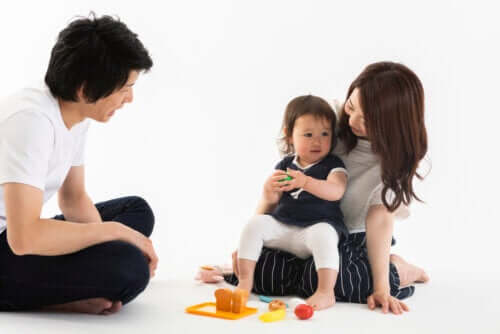What Tone of Voice to Use When Disciplining You Children

There are many parents who, when disciplining their children, speak harshly. Sometimes they shout and, at times, can even become aggressive. This is never a sign of good parenting. Shouting doesn’t educate children, but rather, it produces fear and resentment. But what’s the right tone of voice to use when we correct our children?
A more empathetic, understanding, and caring tone is much more effective when it comes to disciplining children. The key is to be genuine. In other words, be completely sincere and use a calm tone of voice. If you speak out of anger, your children will realize it and your words won’t be as effective.
Discipline is complicated
Discipline is one of the most complicated parts of raising children. Especially because we don’t want our children to suffer but, at the same time, they need to learn certain lessons. On occasion, parents become too permissive due to a desire to protect their children from negative emotions. But these parents aren’t doing their children any favors. In fact, quite the opposite.
Children who grow up without a concrete discipline structure or without consistent education are less prepared to handle adult life. Parents need to create a predictable structure for their kids that includes rules and limits. That way, children will know what’s expected of them at any given moment.

Your tone of voice matters
Many parents believe they need to use a severe voice in order to discipline their children. Some even think they need to scream at their kids in order to correct their behavior. But nothing could be further from the truth. What we need to understand very clearly is that shouting and verbally mistreating our children is in no way the best way to discipline them.
If we remember that disciplining is synonymous with teaching, then we’ll change our perspective and approach. If you shout or speak aggressively with your children, you’ll be nullifying their ability to learn. Children feel bad emotionally and block out any sort of learning.
If you give orders with an aggressive tone of voice, children’s brains automatically go into fight or flight mode. This causes children to become very resistant and uncooperative. What’s more, they become emotionally resentful towards their parents for not being more empathetic.
Increase your empathy when disciplining your children
Parents suffer when their children suffer, but that doesn’t mean we should throw our rules out the window. Being permissive only causes more damage further down the road. Ideally, we should take on a new approach to discipline. Speaking to your child with a calm and empathetic tone of voice about the consequences of their actions is always a good starting point to effective discipline.
Use a tone of voice that’s calm and comes from your heart, and try to understand your children rather than attacking. This way, your child will feel accepted and know that you love them even when you’re correcting them, because that’s your role as a parent.
There’s no need to shout. The world is harsh enough and children need their homes to be a place that offers not only physical shelter but emotional shelter as well. Let your children face the established and natural consequences of their actions. But, at the same time, be sure to be there to offer your support.

On many occasions, the consequences speak for themselves. But you, as a mother or father, should remain faithful to your limits as you speak to your child in a calm, loving, and, above all, empathetic tone of voice.
What to do if you feel like you’re always yelling at your children
Perhaps you’ve already developed a habit of yelling at your children and speaking to them in an unkind way. Maybe you grew up with this kind of upbringing and think it’s the only way to get your children to obey you. And maybe when you speak to them calmly, it seems like they ignore you.
First, you need to understand that, if you’re always shouting, then you’ll always need to shout. That’s because your children get used to you shouting all the time. They think they don’t need to take you seriously unless you get angry and raise your voice. It becomes a vicious cycle.
Avoid using an aggressive tone of voice
Using an aggressive tone of voice may produce short-term results, but it fails in the long run. Shouting doesn’t educate children. If you shout too often, you’ll only end up destroying your relationship with your kids. And as they grow older, if you want them to trust you, you need to maintain good communication with them. Therefore, you should make a point early on in their childhood to use a calm tone of voice when you correct them.
You should save raising your tone of voice for true emergencies. In other words, those times when there’s a safety risk and you need to get your children’s attention as soon as possible to avoid injury to themselves or others. Once the danger has been averted, you should return to your calm tone of voice.
There are many parents who, when disciplining their children, speak harshly. Sometimes they shout and, at times, can even become aggressive. This is never a sign of good parenting. Shouting doesn’t educate children, but rather, it produces fear and resentment. But what’s the right tone of voice to use when we correct our children?
A more empathetic, understanding, and caring tone is much more effective when it comes to disciplining children. The key is to be genuine. In other words, be completely sincere and use a calm tone of voice. If you speak out of anger, your children will realize it and your words won’t be as effective.
Discipline is complicated
Discipline is one of the most complicated parts of raising children. Especially because we don’t want our children to suffer but, at the same time, they need to learn certain lessons. On occasion, parents become too permissive due to a desire to protect their children from negative emotions. But these parents aren’t doing their children any favors. In fact, quite the opposite.
Children who grow up without a concrete discipline structure or without consistent education are less prepared to handle adult life. Parents need to create a predictable structure for their kids that includes rules and limits. That way, children will know what’s expected of them at any given moment.

Your tone of voice matters
Many parents believe they need to use a severe voice in order to discipline their children. Some even think they need to scream at their kids in order to correct their behavior. But nothing could be further from the truth. What we need to understand very clearly is that shouting and verbally mistreating our children is in no way the best way to discipline them.
If we remember that disciplining is synonymous with teaching, then we’ll change our perspective and approach. If you shout or speak aggressively with your children, you’ll be nullifying their ability to learn. Children feel bad emotionally and block out any sort of learning.
If you give orders with an aggressive tone of voice, children’s brains automatically go into fight or flight mode. This causes children to become very resistant and uncooperative. What’s more, they become emotionally resentful towards their parents for not being more empathetic.
Increase your empathy when disciplining your children
Parents suffer when their children suffer, but that doesn’t mean we should throw our rules out the window. Being permissive only causes more damage further down the road. Ideally, we should take on a new approach to discipline. Speaking to your child with a calm and empathetic tone of voice about the consequences of their actions is always a good starting point to effective discipline.
Use a tone of voice that’s calm and comes from your heart, and try to understand your children rather than attacking. This way, your child will feel accepted and know that you love them even when you’re correcting them, because that’s your role as a parent.
There’s no need to shout. The world is harsh enough and children need their homes to be a place that offers not only physical shelter but emotional shelter as well. Let your children face the established and natural consequences of their actions. But, at the same time, be sure to be there to offer your support.

On many occasions, the consequences speak for themselves. But you, as a mother or father, should remain faithful to your limits as you speak to your child in a calm, loving, and, above all, empathetic tone of voice.
What to do if you feel like you’re always yelling at your children
Perhaps you’ve already developed a habit of yelling at your children and speaking to them in an unkind way. Maybe you grew up with this kind of upbringing and think it’s the only way to get your children to obey you. And maybe when you speak to them calmly, it seems like they ignore you.
First, you need to understand that, if you’re always shouting, then you’ll always need to shout. That’s because your children get used to you shouting all the time. They think they don’t need to take you seriously unless you get angry and raise your voice. It becomes a vicious cycle.
Avoid using an aggressive tone of voice
Using an aggressive tone of voice may produce short-term results, but it fails in the long run. Shouting doesn’t educate children. If you shout too often, you’ll only end up destroying your relationship with your kids. And as they grow older, if you want them to trust you, you need to maintain good communication with them. Therefore, you should make a point early on in their childhood to use a calm tone of voice when you correct them.
You should save raising your tone of voice for true emergencies. In other words, those times when there’s a safety risk and you need to get your children’s attention as soon as possible to avoid injury to themselves or others. Once the danger has been averted, you should return to your calm tone of voice.
This text is provided for informational purposes only and does not replace consultation with a professional. If in doubt, consult your specialist.








